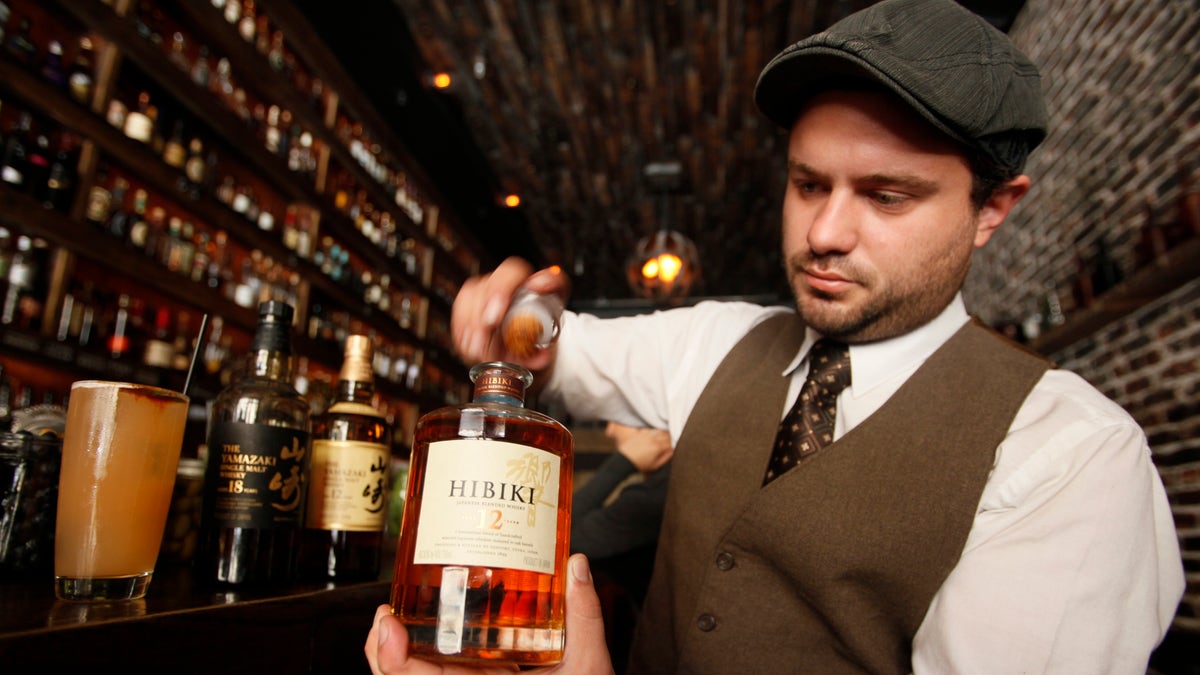
General manager Owen Westman opens a bottle of 12-year-old Hibiki Japanese whisky at the Rickhouse bar in San Francisco, Friday, Aug. 6, 2010. At left is a cocktail called the Mamie Taylor made with Japanese whiskey along with bottles of Yamazaki whiskeys. Although best known for sake, Japan has a whisky tradition stretching back more than a century. It's not widely available in the U.S., but that's changing as companies like major producer Suntory work to boost overseas sales.(AP Photo/Eric Risberg) (AP)
SAN FRANCISCO - It wasn't too long ago that Owen Westman's customers at Rickhouse Bar didn't even know there were Japanese whiskies available, let alone ask for them by name.
"They certainly do now," he says.
Although best known for sake, Japan has a whisky tradition stretching back more than a century. It's not widely available in the U.S., but that's changing as companies like major producer Suntory work to boost overseas sales.
And maybe Bill Murray had something to do with it. His character in the 2003 movie "Lost in Translation" goes to Japan to shoot a whisky commercial.
Suntory exports a number of products, including Yamazaki single malt whiskies and Hibiki, a blend. Like Scotch, the Japanese product is spelled without the extra "e." In fact, the origins of the Japanese whisky industry have ties to Scotland. Suntory founder Shinjiro Torii hired Masataka Taketsuru, who studied distilling in Scotland. Taketsuru went on to found Nikka, also a major producer.
Despite that history, Suntory whisky is "not Scotch made in Japan," points out Eric Ariyoshi, a Suntory brand manager based in San Francisco.
One of Torii's goals was "to really create a Japanese whisky that catered to a more subtle palate," says Ariyoshi. "If you think about Japanese food it tends to be on the lighter side, very subtle flavors. One of his specific goals was to create a whisky that fits into that palate."
Overall, Japanese whisky is a fraction of total U.S. sales. Suntory launched the Hibiki brand in Europe and the U.S. last year with sales of 6,000 cases. This year, they hope to sell 8,000 cases of Hibiki overseas and 31,000 cases of Yamazaki. To put that into perspective, 2009 total whiskey sales in the United States amounted to 46.5 million cases, according to the U.S. Distilled Spirits Council.
But with interest in spirits rising, there's more attention being paid to all types of whiskies, says council spokesman Frank Coleman.
"There clearly has been a whiskey revival over the last decade and consumer interest is at an all-time high," he said. "You have the explosion in the number of small craft distillers getting into the whiskey game. Consumers have become more and more interested in trying these new and different products and there's no doubt some very good whiskies being made in Japan."
Barrel aging is key to how a whisky tastes and Suntory uses three kinds, American and Spanish oak as well as Japanese mizunara oak. American white oak contributes a dry flavor with hints of vanilla, the Spanish oak has flavors of raisins, chocolate and caramel and the mizunara gives subtle sweetness and spiciness, reminiscent of incense.
The Hibiki is a blend of more than 30 individual whiskies, with the final blend topped off with a whisky aged more than 30 years. Elegant and smooth, Hibiki uses old plum liqueur casks for aging some components and a bamboo charcoal filter that "just mellows out the flavor. Gives it a very sweet and gentle flavor," Ariyoshi says.
In a nod to tradition, the Hibiki packaging has 24 facets to represent the ancient Japanese calendar that divided the year into 24 "seasons."
At Rickhouse, bartenders pour the Yamazaki 12-year-old and 18-year-old single malts as well as the Hibiki blend. Most customers ask for it neat, although the bar has some interesting cocktails, including one involving cherry preserves.
You can get the 18-year-old Yamazaki at the Father's Office bar in Los Angeles, too. But you have to know what to ask for.
Chef and owner Sang Yoon, who also has a Father's Office in Santa Monica, couldn't find a way to mesh the whisky with his menu, but since he likes it, he kept a bottle at his LA location for friends. Those in the know ask for "Relaxing Times," a tagline from a Suntory advertising campaign that was also in "Lost in Translation."
If Murray happens to stroll in, bartenders have been advised he can just ask for "a me," Yoon says.
